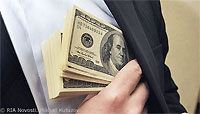Russian regulator proves first case of insider trading

(Interfax – MOSCOW, July 2, 2013) The Federal Financial Markets Service (FFMS) has for the first time proven a case of insider trading on the Russian market, the head of the regulator, Dmitry Pankin said on his official blog.
The case concerns transactions with shares in cosmetics firm Kalina (RTS: KLNA) in the fall of 2011, ahead of the announcement of a deal in which multinational Unilever acquired a controlling stake in the company.
“Many market participants, representatives of the media and the business community pointed out the growth of Kalina’s share price ahead of the deal by Unilever, through LLC Unilever Rus, to buy a controlling stake in Kalina. In this period, I was often asked about the possible illegal use of insider information in the purchase of Kalina shares. That was when the service began investigating this case,” Pankin said.
The FFMS obtained and analysed information concerning more than 300 individuals and about 50 legal entities that were involved in the preparation of the deal.
“In the course of the investigation, it was established that a number of persons directly associated with the deal illegally used insider information at their disposal and acquired Kalina shares. One of these persons was an employee of Kalina who held a management position. Initially, he made deals with the shares in his own name, then through brokerage accounts registered to other persons. In addition, insider information was unlawfully used by a legal entity registered in a foreign jurisdiction that carried out deals to purchase Kalina shares on the over-the-counter market,” Pankin said.
The scale of the trades made using insider information exceeded several hundred million rubles.
The regulator will submit the materials of the case to law enforcement agencies, Pankin said.
Kalina’s market capitalization began to grow in the second half of September 2011, long before the official announcement of the deal with Unilever. The company’s share price rose from 1,250 rubles on September 23 that year to 2,250 rubles on October 7, although there was no positive news about the company reported in these two weeks. The Unilever deal was announced on October 14; the multinational paid 4,098 rubles per share.
The FFMS announced on October 17, 2011 that it would request information from exchanges on transactions with Kalina shares ahead of the announcement of the deal.
The FFMS has a system to monitor for irregularities in securities trading on exchanges. When such trades are flagged, the regulator request information from exchanges about the transactions in question in order to conduct a comprehensive analysis. Following the analysis, the regulator may decide to conduct an investigation into possible manipulation of prices and/or unlawful use of insider information.
The FFMS has already had many cases in which it has found manipulation on the stock market, including cases that have been prosecuted. But investigations into insider trading in the several years that Russia has had such a law have been fruitless until now. Investigations have been conducted in the past concerning fluctuations in prices for shares in companies such as oil major Rosneft (RTS: ROSN), national telecommunications operator Rostelecom (RTS: RTKM) and diamond monopoly Alrosa (RTS: ALRS), among others.
